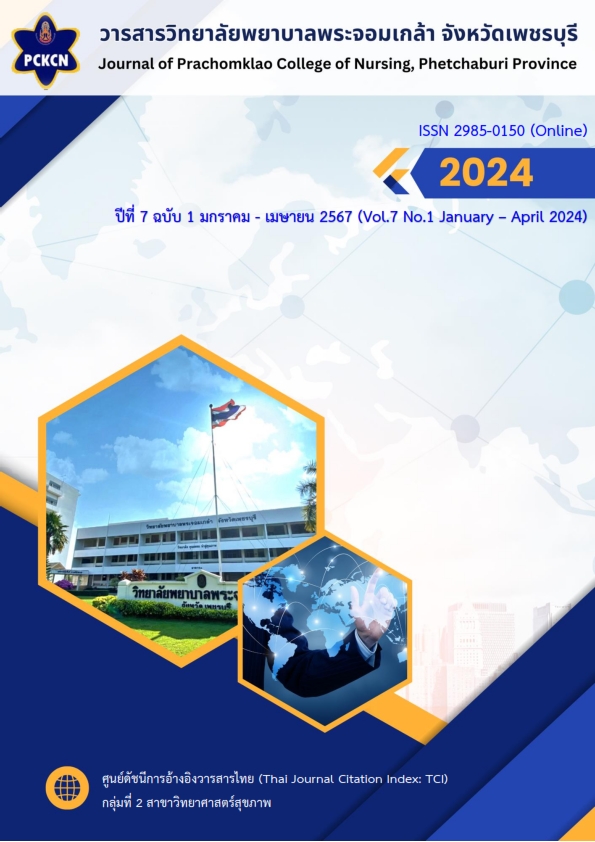ความสัมพันธ์ระหว่างอายุ ประสบการณ์การหกล้ม ระยะเวลาเจ็บป่วย และภาวะซึมเศร้า กับความกลัวการหกล้มของผู้สูงอายุโรคพาร์กินสัน
Main Article Content
บทคัดย่อ
การวิจัยเชิงพรรณนา มีวัตถุประสงค์เพื่อศึกษาระดับความกลัวการหกล้มและความสัมพันธ์ระหว่างอายุ ประสบการณ์การหกล้ม ระยะเวลาเจ็บป่วย และภาวะซึมเศร้ากับความกลัวการหกล้มของผู้สูงอายุโรคพาร์กินสัน กลุ่มตัวอย่างเป็นผู้สูงอายุโรคพาร์กินสันที่มาตรวจตามนัดที่แผนกผู้ป่วยนอกโรงพยาบาลสรรพสิทธิประสงค์ อุบลราชธานี จำนวน 133 คน เก็บข้อมูลด้วยแบบสัมภาษณ์ข้อมูลส่วนบุคคล แบบประเมินภาวะซึมเศร้า และแบบประเมินความกลัวการหกล้ม ซึ่งค่าความเชื่อมั่นสัมประสิทธิ์แอลฟาของครอนบาคเท่ากับ .85 และ .95 ตามลำดับ วิเคราะห์ข้อมูลโดยใช้สถิติเชิงพรรณนา และการวิเคราะห์สัมประสิทธิ์สหสัมพันธ์เพียร์สัน
ผลการวิจัยพบว่า ผู้สูงอายุโรคพาร์กินสันมีความกลัวการหกล้มอยู่ในระดับมาก ร้อยละ 98.50 (M = 46.51, SD = 7.08) ภาวะซึมเศร้า ประสบการณ์การหกล้ม ระยะเวลาเจ็บป่วย และอายุมีความสัมพันธ์ทางบวกกับความกลัวการหกล้มของผู้สูงอายุโรคพาร์กินสัน อย่างมีนัยสำคัญทางสถิติที่ระดับ .01 (r = .57, 52, 48 และ .40 ตามลำดับ)
บุคคลากรทางด้านสุขภาพสามารถนำผลการวิจัยไปพัฒนาโปรแกรมในการส่งเสริมความมั่นใจในตนเอง เพื่อลดปัจจัยเสี่ยงต่อการพลัดตกหกล้ม และลดความกลัวการหกล้มในผู้สูงอายุโรคพาร์กินสัน
Downloads
Article Details

อนุญาตภายใต้เงื่อนไข Creative Commons Attribution-NonCommercial-NoDerivatives 4.0 International License.
เนื้อหาและข้อมูลที่เผยแพร่ในวารสารวิทยาลัยพยาบาลพระจอมเกล้า จังหวัดเพชรบุรี ถือเป็นข้อคิดเห็นและความรับผิดชอบของผู้นิพนธ์บทความโดยตรง บทความ เนื้อหา ข้อมูล รูปภาพ ฯลฯ ที่ได้รับการเผยแพร่ในวารสารนี้ ถือเป็นลิขสิทธิ์ของวารสารฯ หากบุคคลหรือหน่วยงานใดต้องการนำทั้งหมดหรือส่วนหนึ่งส่วนใดไปเผยแพร่หรือเพื่อกระทำการใด ๆ จะต้องอ้างอิงวิทยาลัยพยาบาลพระจอมเกล้า จังหวัดเพชรบุรี ทุกครั้ง
เอกสารอ้างอิง
Albay, V. B., & Tutuncu, M. (2021). Fear of falling: An independent factor affecting health-related quality of life in patients with Parkinson’s disease. Neurology India, 69(3), 643-647. https://doi.org/10.4103/0028-3886.319225
Bandura, A. (1997). Self-efficacy: The exercise of control (4th ed.). W. H. Freeman.
Bhidayasiri, R. (2019). Thai national formulary 2019 drugs used in Parkinson’s disease. Graphic and Design Publishing House. (in Thai)
Buhmann, C., Kassubek, J., & Jost, W. H. (2020). Management of pain in Parkinson’s disease. Journal of Parkinson's Disease, 10(suppl 1), 37-48. https://doi.org/10.3233/JPD-202069
Chen, P. H., Yang, Y. Y., Liao, Y. Y., Cheng, S. J., Wang, P. N., & Cheng, F. Y. (2022). Factors associated with fear of falling in individuals with different types of mild cognitive impairment. Brain Sciences, 12(8), Article 990. https://doi.org/10.3390/ brainsci12080990
Chikatimalla, R., Dasaradhan, T., Koneti, J., Cherukuri, S. P., Kalluru, R., & Gadde, S. (2022). Depression in Parkinson’s disease: A narrative review. Cureus, 14(8), Article 27750. https://doi.org/10.7759/cureus.27750
Cong, S., Xiang, C., Zhang, S., Zhang, T., Wang, H., & Cong, S. (2022). Prevalence and clinical aspects of depression in Parkinson’s disease: A systematic review and meta analysis of 129 studies. Neuroscience & Biobehavioral Reviews, 141, Article 104749. https://doi.org/10.1016/j.neubiorev
Eliopoulos, C. (2018). Gerontological nursing (9th ed.). Lippincott Willams & Wilkins.
Farombi, T. H., Owolabi, M. O., & Ogunniyi, A. (2016). Fall and their associated risk in Parkinson’s disease patient in Nigeria. Journal of Movement Disorder, 9(3), 160-165. https://doi.org/10.14802/jmd.16011
Faul, F., Erdfelder, E., Lang, A. G., & Buchner, A. (2007). G*Power 3: A flexible statistical power analysis program for the social, behavioral, and biomedical sciences. Behavior Research Methods, 39(2), 175-191.
Jitapunkul, S., Lailert, C., Worakul, P., Srikiatkhachorn, A., & Ebrahim, S. (1996). Chula mental test: A screening test for elderly people in less developed countries. International Journal of Geriatric Psychiatry, 11(8), 715-720. (in Thai)
Jonasson, S. B., Nilsson, M. H., Lexell, J., & Carlsson, G. (2018). Experiences of fear of falling in persons with Parkinson’s disease–a qualitative study. BMC Geriatrics, 18(1), Article 44. https://doi.org/10.1186/s12877-018-0735-1
Jung, Y. J., Kim, R., Yoo, D., Han, K., & Lee, J. Y. (2020). Late-life falling and depressive symptoms associated with the risk of Parkinson’s disease: A nationwide cohort data analysis. BMC Geriatrics, 20(1), Article 284. https://doi.org/10.1186/s12877-020-01691-9
Landers, M. R., & Nilsson, M. H. (2023). A theoretical framework for addressing fear of falling avoidance behavior in Parkinson’s disease. Physiotherapy Theory and Practice, 39(5), 895-911. https://doi.org/10.1080/09593985.2022.2029655
Lindholm, B., Hagell, P., Hansson, O., & Nilsson, M. H. (2014). Factors associated with fear of falling in people with Parkinson’s disease. BMC Neurology, 14(1), Article 19. http://www.biomedcentral.com/1471-2377/14/19
Lindh-Rengifo, M., Jonasson, S. B., Mattsson, N., Ullén, S., & Nilsson, M. H. (2019). Predictive factors of concerns about falling in people with Parkinson’s disease: A 3-year longitudinal study. Parkinson’s Disease, 2019, Article 4747320. https://doi.org/10.1155/2019/4747320
Ou, Z., Pan, J., Tang, S., Duan, D., Yu, D., Nong, H., & Wang, Z. (2021). Global trends in the incidence, prevalence, and years lived with disability of Parkinson's disease in 204 countries/territories from 1990 to 2019. Frontiers in Public Health, 9, Article 776847. https://doi.org/10.3389/fpubh.2021.776847
Palakurthi, B., & Burugupally, S. P. (2019). Postural instability in Parkinson’s disease: A review. Brain Sciences, 9(9), Article 239. https://doi.org/10.3390/brainsci9090239
Rider, J. V., Longhurst, J. K., Lekhak, N., Young, D. L., & Landers, M. R. (2022). Fear of falling avoidance behavior assessment and intervention in Parkinson’s disease: A scoping review. Research and Reviews in Parkinsonism, 12, 1-17. https://doi.org/10.2147/JPRLS.S350890
Sunpasitthiprasong Hospital. (2023). Information of Parkinson's disease 2023. Sunpasitthiprasong Hospital. (in Thai)
Srisa-ard, B. (2017). Preliminary research (10th ed.). Suweeriyasan. (in Thai)
Strategy and Planning Division, Ministry of Public health. (2020). Summary of illness reports 2019. https://spd.moph.go.th/wp-content/uploads/2022/08.pdf (in Thai)
The Manual’s Editorial Staff. (2022). Parkinsonism (Secondary parkinsonism; Atypical parkinsonism). https://www.msdmanuals.com/home/quick-facts-brain,-spinal-cord,-and-nerve-disorders/movement-disorders/parkinson-disease-pd
Thiamwong, L. (2011). Psychometric testing of the fall efficacy scale-international (FES-I) in Thai older adults. Songkla Medical Journal, 29(6), 277-287. (in Thai)
Train the Brain forum Committee. (1994). Thai geriatric depression scale: TGDS. Siriraj Medical Journal, 46(1), 1-9. (in Thai)


